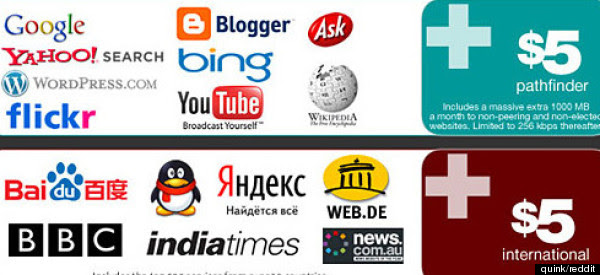A graphic making its rounds on the web this week offered a glimpse of what the Internet might look like if net neutrality disappears. The takeaway? Not good.
A federal appeals court on Tuesday struck down an Federal Communications Commission order that required Internet service providers to abide by the rules of “net neutrality.” ISPs had previously been forced to treat all types of web traffic equally -- meaning providers couldn’t block some sites or speed up loading times for others. Tuesday's decision means corporations can now block or slow down loading times for pages they don’t like, or could charge businesses a fee to have their pages load more quickly -- or at all.
Now, consumers looking to get Internet access might be met with something like this hypothetical set of pricing options like this, pointed out by Buzzfeed earlier this week:
This graphic was created by Reddit user quink, who wanted to illustrate what happens if net neutrality disappears. Originally created when Comcast tried to appeal the FCC's right to enforce net neutrality in 2009, the graphic is experiencing a renaissance in relevance after the ruling this week.
Though the FCC could try to rewrite its rule or appeal the decision, in the meantime ISPs like Comcast, Verizon, AT&T and Time Warner Cable are free to make deals with companies promising quicker content delivery in exchange for payment -- essentially creating Internet "fast lanes" for wealthy companies and making their websites easier to access than those of nonprofits, activist groups and smaller competitors.
Quink's graphic shows web-based service offerings (offered by the fictional TELCO ADSL) that look suspiciously like cable bundles. Very, very basic Internet is offered for a "starter" price of $29.95, while popular sites are bundled together and offered as optional add-ons for $5 to $10. As costs add up, people in quink's world are left with tough choices -- choosing, for instance, between access to online marketplaces and access to the news.
As for smaller sites? In quink's hypothetical world without net neutrality, they're out of luck. Any sites outside the bundles might count towards a data cap, while sites in the bundles wouldn't, or small sites might just load really, really slowly.
Presumably, websites that want to be included in "bundles" would have to pay providers like TELCO for the privilege. It may sound crazy, but it's the future envisioned by experts who talk about what the end of net neutrality might mean for small businesses.
The really remarkable thing about quink's graphic, though, is how very much it looks like the current state of cable television. For an example, we pulled a screenshot of the current Time Warner Cable options for customers in Manhattan. Each subscription option contains a bundle of channels, like so:
"Information shouldn't become a luxury," Todd O’Boyle, program director of the liberal advocacy organization Common Cause, told The Huffington Post earlier this week. And yet it's clear that at least as far as the purveyors of cable television are concerned, information is a luxury -- and one that should be paid for. Those who subscribe to Time Warner Cable's expensive "Preferred TV" bundle get access to all the TV news channels, while subscribers to Time Warner's relatively bare-bones "Starter TV" bundle must content themselves with C-SPAN and Time Warner Cable News NY1.
Will the end of net neutrality see ISPs imitating cable companies? It seems likely, given that many ISPs already are cable companies.
The more pressing question is whether the FCC and the federal government will allow this to happen. Some commentators, like the Atlantic's Kevin Werbach, believe the D.C. Circuit Court's ruling will simply pave the way for better enforcement of net neutrality in the future. We certainly hope he's right.

Something smells rotten.
ReplyDeleteSomeone is lobbying hard somewhere. You can bet on that. Time to do away with lobbyists.
Delete